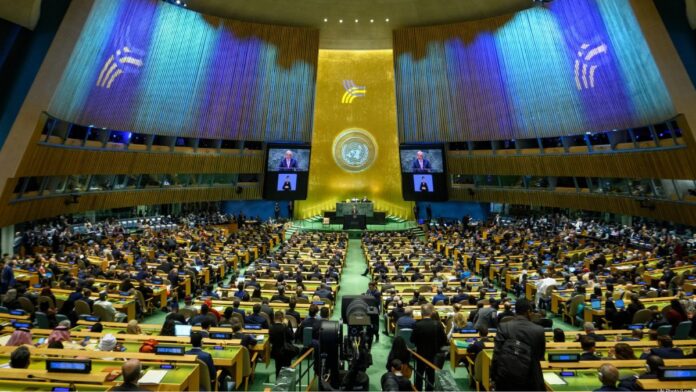The United Nations General Assembly adopted a historic “Pact for the Future” on Sunday, aimed at addressing some of the most pressing global challenges of the 21st century, including climate change, human rights, conflict resolution, and global governance.

The pact, seen as a roadmap for international cooperation, was endorsed by member states at the UN headquarters in New York. However, a small group of seven countries, led by Russia, opposed the adoption, attempting a last-minute amendment that was ultimately rejected.
In a consensus decision, world leaders embraced the pact, which covers a broad range of themes such as peace and security, sustainable development, digital cooperation, youth and future generations, and gender equality. The adoption of two annexes, the Global Digital Compact and the Declaration on Future Generations, further strengthened the commitment to addressing future global needs.
UN Secretary-General António Guterres hailed the pact as a transformative step towards a more effective and inclusive form of multilateralism. “We are here to bring multilateralism back from the brink,” Guterres said, calling for global cooperation that matches the scale of modern-day challenges. “We must take the first decisive steps towards updating and reforming international cooperation,” he added.
Guterres had organized the ‘Summit of the Future,’ where he underscored the need for the Pact, citing the turbulent and transitional times the world is currently facing. He emphasized that the agreement will pave the way for new opportunities and untapped possibilities in global governance, especially in areas such as digital cooperation and artificial intelligence (AI).
In the adopted version, leaders pledged to reform international institutions to keep pace with the rapidly changing world. The pact outlines 56 actions, which include a commitment to multilateralism, peacekeeping, and upholding the UN Charter. It also calls for reforms to the UN Security Council and international financial institutions, along with renewed efforts to combat climate change, promote disarmament, and manage the development of AI.
The Global Digital Compact, an annex of the pact, sets principles for a human-centered digital future, including the international regulation of AI. The Declaration on Future Generations, another annex, recognizes the rights of future generations and emphasizes their inclusion in decision-making processes.
Despite the widespread support for the pact, Russia and its allies—Belarus, North Korea, Iran, Nicaragua, and Syria—opposed it, citing concerns about the “principle of non-interference in the internal affairs of states.” Russia introduced an amendment that called for the UN to avoid duplicating efforts and reaffirmed national sovereignty. However, the Democratic Republic of the Congo quickly submitted a motion to reject Russia’s amendment, which was passed by an overwhelming majority of 143 votes in the General Assembly.
The President of the General Assembly, Philemon Yang, praised the adoption of the pact, noting that it “lays the foundation for a sustainable, just, and peaceful global order—for all peoples and nations.”




